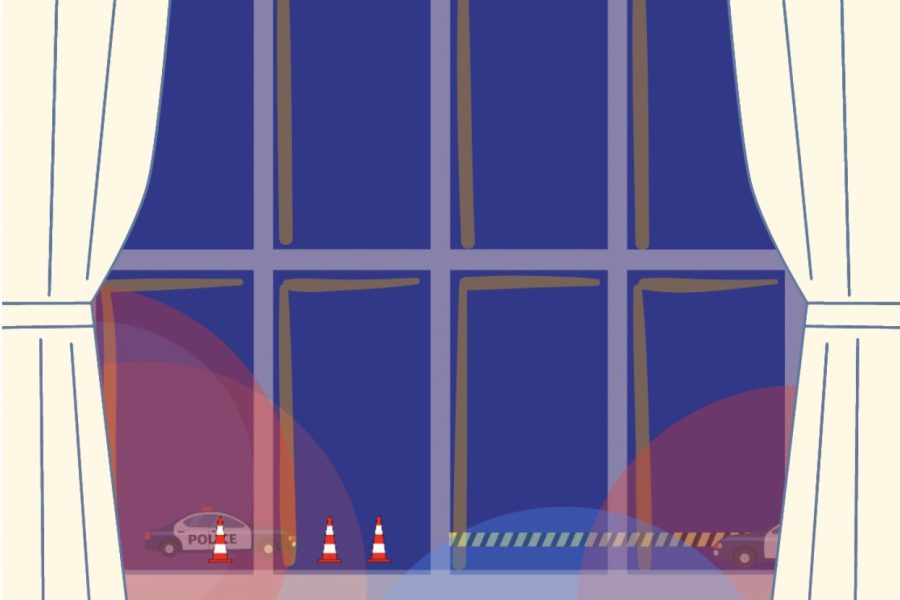Opinion: Small towns need to learn how to handle big rumors
WSPN’s Penelope Biddle discusses the harm that fake news can cause when it is spread unchecked. For example, the incident that occurred on the night of May 2, 2022 and left many residents with questions.
May 20, 2022
Wayland’s relatively small size means news travels fast, but unfortunately fake news can travel even faster. Perhaps the most harmful effect of Wayland’s size is the damage that can be caused from rumors like these.
Let’s get something straight: no one was hurt on the corner of West Plain Street and Route 126 on the night of Sunday, May 2. This might not need to be clarified as it’s been over two weeks since Wayland, Framingham and state police responded to the “health episode”, blocking off the street. As time passes, the rumors surrounding the situation have hopefully died off but, in a town like Wayland, it’s hard to be sure.
To avoid sounding like a corny murder mystery, I won’t say that we are “in a town where everybody knows everybody else,” because that’s just not true. Wayland’s not nearly that small, close knit or ominous. However, because the population is made up of mostly families with many relationships made through them, the communication in our town can form a messy web that perfectly catalyzes misinformation.
Yet, the sense of hysteria is a feeling that everyone has felt after hearing about this troubling incident. When an active road is lined with flashing police cars and closed off for hours, people search for an explanation. So little happens in Wayland, that there is almost no question that others noticed the commotion. Knowing this, people likely felt assured that someone they knew would have information. Trust in our community is a wonderful thing, but complete assurance and reliance on it while looking for the truth is dangerous and can begin a cycle of misinformation.
Facebook is one of the places many Wayland residents turn to in the community for an explanation regarding many instances. In this scenario, many did. Residents were quick to discuss the incident on the “Wayland Community Forum” Facebook page. Luckily, members of the page stayed cautious of speculation and it doesn’t seem to be where the rumors were spread. The discussion generally had a positive effect as it was able to calm some understandably concerned residents. Here lies the power and deceit of social media.
However, the page does have a history of jumping to conclusions. Recently, our community saw a much more uncontrolled situation in the comments of a different post. This was where the attempted cancellation of a St. Patrick’s Day party was rumored to be an action of the WHS administration. The speculations, which turned out to be false, started disagreements between some parents and students who consequently felt a temporary loss of trust in the administration. WHS Principal Allyson Mizoguchi stated that this type of misinformation was harmful to the WHS community.
If a rumor reaches a point where it’s widely accepted, a new burden gets placed on those who report what actually happened to make sure the truth is given justice. An extra step gets added where before being informed, misinformation must be cleared up and removed from people’s minds. This slows down the circulation of accurate information and in worse scenarios only gives more attention to falsehoods. In some cases, the only reason news coverage needs to happen is to diffuse rampant rumors.
Recently, the Wayland Town Crier was bought by a company called Gannett and then almost immediately shut down. Wayland is not alone either, as across Massachusetts, local newspapers have been closed, with more following this pattern around the country. By no means do I think the Town Crier, which was published weekly, would have put a stop to the misinformation surrounding the “health episode” in time. However, the Town Crier’s absence and the lack of other local news should not be ignored. We are lucky to have the Wayland Patch, which published an article less than a day after the events. It makes sense for more of our news to be found online and this doesn’t make the news any less accurate. Online news is simply more accessible and it reports much faster. Still, it’s concerning to see how rapidly we are losing local news and I have no doubt that we will start to see even more consequences as we continue to weed out good journalists and newspapers.
The truth is, your friend who lives near West Plain Street not only has a view outside their window that no one else has, but also your trust. When looking for an explanation, we always look to a place we trust first, as everyone should. That’s the best place to start.
After taking that initial step, it’s incredibly important we keep on searching for different perspectives and don’t fully accept the first and only explanation we hear. The search for a multitude of trustworthy resources is not a necessary measure for local news, though. It should be applied to the way we find and absorb our nationwide and global news. It’s dangerous for our country to have misinformed citizens, but unfortunately many people don’t look beyond one place for information or know how to fact check it due to utter laziness.
Even when it’s not laziness standing between us and facts, we still have a responsibility for seeking out information ourselves. It’s true, having as many trustworthy sources as possible isn’t easy. We can’t just create places to find reliable information out of thin air. A search for an explanation can take a while. In the meantime, don’t believe everything you hear.





![Last Wednesday, the Wayland School Committee gathered to discuss a number of topics regarding the health curriculum and Innovation Career Pathway course. Another large topic of conversation was the ways to potentially mitigate distracting cell phone usage. "These [phones] are going to distract your learning and social relationships," Superintendent David Fleishman said. "That's concrete right there."](https://waylandstudentpress.com/wp-content/uploads/2025/06/Screenshot-2025-06-04-at-9.49.31 PM-1200x886.png)



























![Troy Hoyt finishes the Boston Marathon, running for the Hoyt Foundation. T. Hoyt is the son of Hoyt Foundation CEO Russ Hoyt.
“[Running a marathon] might seem like a big thing, when it’s presented to you at first, but if you break it up and just keep telling yourself, “Yes, you can,” you can start chipping away at it. And before you know it, you’ll be running the whole 26 miles, and you won’t even think twice about it.” T. Hoyt said.](https://waylandstudentpress.com/wp-content/uploads/2025/04/C36E8761-1CBB-452E-9DF2-543EF7B1095E_1_105_c.jpeg)














































Dave Bernstein • May 23, 2022 at 2:21 PM
re “However, the page does have a history of jumping to conclusions.”
Web pages are incapable of jumping to conclusions; only people can do that. Every post to the Wayland Community Forum is signed by a real person that the Forum’s Administrators have confirmed is a resident of Wayland or a surrounding town. People who habitually jump to incorrect conclusions or propagate misinformation in their posts to the Forum soon loose credibility; their subsequent posts are taken with a grain of salt, if not completely ignored.
There is a huge difference between a Facebook forum under active administration, and generic social media where a poster can claim to be whoever they wish. Wayland is fortunate to have a group of dedicated Administrators; they make the “Wayland Community Forum” an asset, rather than a liability.